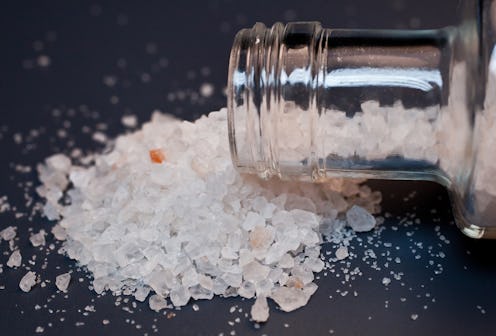News
Is Flakka Bad For You?

Face-eating zombies are back and crazier than ever. A new drug called Flakka has made headlines recently after its users promptly began Hulking-out on law enforcement officers and neighbors and streaking into oncoming traffic. The drug, which is essentially a synthetic, crystallized powder cathinone similar to bath salts, works as an amphetamine stimulant to produce euphoric feelings and "increased sociability" (read: "sex drive"), according to reports by the National Institute on Drug Abuse (NIH). With all the talk surrounding the drug's relatively cheap cost — only $5 in most places — and the outlandish behavior of its users, it's seems almost redundant to ask, is Flakka bad for you? It can actually produce some seriously scary side effects.
"This is bad stuff," epidemiologist James N. Hall, co-director of the Center for the Study and Prevention of Substance Abuse at Nova Southeastern University, told NBC last Wednesday. "The biggest danger is these are guinea pig drugs and the users are like lab rats."
At least lab rats can't impale themselves on fences or threaten to kill someone with a gun. The New Times Broward-Palm Beach in Florida reported in February that a local man, high on Flakka, had stripped off his clothing and climbed onto the roof of an apartment complex, allegedly pointing his gun at passers-by. When police finally pulled him down, they discovered a Smith & Wesson semiautomatic pistol loaded with eight rounds. After his arrest, the man was taken into a local hospital for critical evaluation.
Like bath salts, the amphetamine-like substance can cause the same delusions and superhuman strength as its predecessors — but hold onto your Dare Bears kids, because here's where it gets serious.
According to DEA researchers, Flakka, and other drugs like it, work to intervene in dopamine production within the brain, causing neurotransmitters to become overwhelmed and produce those reported feelings of euphoria. But as all that is happening, a corresponding rise in norepinephrine pushes the heart and blood pressure into the red zone as well, resulting in extraordinary physical abilities. Too much norepinephrine can subsequently cause heart palpitations, vomiting, and severe chest pain, as well as narrowing of the blood vessels near the surface of the skin and in the body's extremities. Not the best way to go out.
Because the drug intervenes in normal brain functions, the effects of the drug "may linger in the system longer than people anticipate," reports LiveScience. So in addition to everything else, Flakka can actually cause the body to overheat — sometimes as high as 105 degrees Fahrenheit.
The NIH reports that in high enough doses, Flakka, which mimics the effects of the khat plant of East Africa and southern Arabia, can result in "dehydration, breakdown of skeletal muscle tissue, and kidney failure," and in some cases, death.
Hall warns that users often overdose on Flakka because they can't tell the difference between a dose that will give them a high and the dose that will kill them. "Just a little (of it) delivers the high effect," Hall told NBC. "But just a little more — and you can't tell by looking at the capsule or baggie."
According to reports by South Florida officials, medical centers often take in around 20 Flakka overdose patients per day, and the number is growing. "This is as close as we've come to a crack cocaine problem since 1995 in terms of the severe reactions, low prices, and that it’s available to young kids, and even homeless populations are now impacted," said Hall in an interview with Fox News on April 10.
Business Insider reports that the drug is currently legal in all states, without its own specific ban — but with all of Flakka's scary side effects in mind, it's probably best to keep your hands off of it no matter what.
Images: DEA.gov; Getty Images (1)